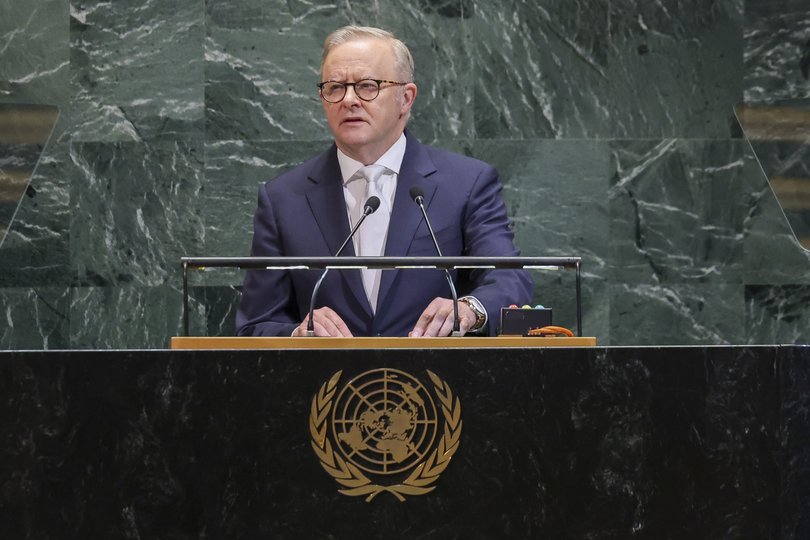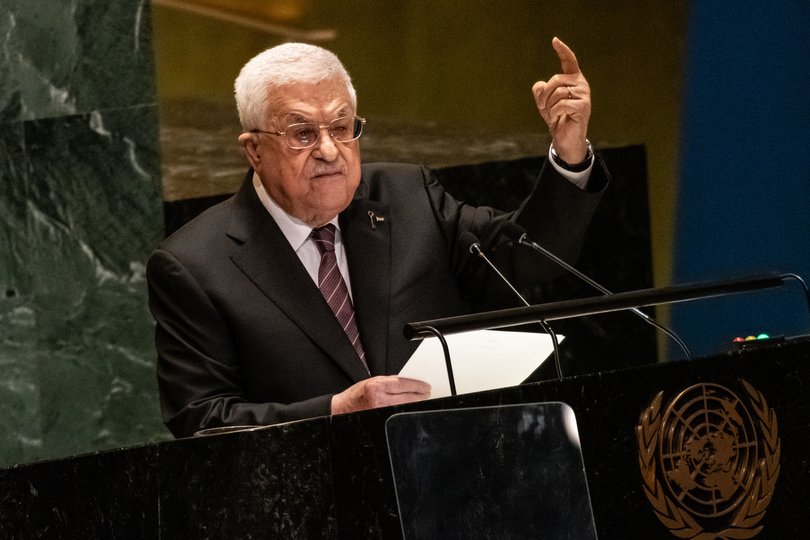BREN CARLILL: Palestinian leader Mahmoud Abbas will be impotent to deliver on promises
BREN CARLILL: Anthony Albanese said that Palestinian recognition was predicated on promises that the Authority President made to him. But here’s the problem - Mahmoud Abbas has no credibility.
Australia recognised Palestine late on Sunday night.
Anthony Albanese said that recognition was predicated on promises that Palestinian Authority President Mahmoud Abbas made to him. But Mr Abbas has made these promises before. They weren’t implemented then, and they won’t be implemented now.
Mr Abbas promised Mr Albanese that he’d hold elections, disarm militias, cease payments to convicted terrorists, reform schools to promote co-existence, and that Hamas would play no role in a Palestinian state.
Sign up to The Nightly's newsletters.
Get the first look at the digital newspaper, curated daily stories and breaking headlines delivered to your inbox.
By continuing you agree to our Terms and Privacy Policy.These reforms are essential to creating a viable Palestine and sustainable Israeli–Palestinian peace. So, to see how popular these vital reforms are, I examined over a decade of Palestinian opinion polls. The results are in my report, Roadmap to Viable Statehood. They are not good news.
Mr Abbas has pledged to dismantle armed groups, including Hamas. In May, two-thirds of Palestinians opposed Hamas disarming to end the war. And polls in 2022 and 2023 show that 87 per cent of Palestinians think the Palestinian government doesn’t have the right to arrest members of armed groups.
Mr Abbas claims the stipends he pays to convicted terrorists and their families have ended, but they haven’t. And polls show strong support among Palestinians for keeping the payments.

Education reform has also been endlessly promised, as it was again to Mr Albanese. Yet anti-peace messaging and glorification of violence remains standard fare. The results are obvious to anyone who cares to look. For instance, an average of 47 per cent of Palestinians think violence is the best way to achieve Palestinian goals, compared to 26 per cent who choose negotiations. Similar pluralities are recorded when “best” is changed to “most effective” or “preferred”. Indeed, between January 2014 and September 2023, on average, more Palestinians supported terrorist attacks against Israeli civilians than were opposed (and support for violence skyrocketed after the October 7 attacks).
Since September 2018, an average of 53 per cent of Palestinians have been opposed to a Palestinian state alongside Israel.
These views are the product of decades of hate messaging in schools and official media, and are inimical to sustainable peace. They are a key reason why all of Mr Abbas’ promises are unpopular.
But here’s the added problem: Mr Abbas is hated.
A popular leader can rely on credibility to push through unpopular reforms. But Mr Abbas has no credibility.
The last elections were 19 years ago. Since then, Mr Abbas has kept promising to hold elections — and kept breaking those promises. After the last cancelled elections, 67 per cent of Palestinians said Mr Abbas cancelled them because he knew he was going to lose. And only a third of Palestinians believe elections, if they are held, will be free and fair.
A large and consistent majority has wished for Mr Abbas to resign since at least 2014. Most Palestinians think the Palestinian Authority — that is, the institution the Australian Government pretends will implement Mr Abbas’ promises — “is a burden on the Palestinian people”. Only a third of Palestinians think they can criticise their government without fear. And a consistent plurality believe that Hamas deserves to represent them more than the Western-backed Fatah. Support for Hamas skyrocketed after the October 7 attacks.

In short, a deeply unpopular leader presiding over a deeply distrusted regime says he’s going to implement deeply unpopular reforms in a society awash with armed groups, which thinks Hamas is the best organisation to represent them, and which thinks violence is preferable to negotiations. Foreign Minister Penny Wong might hope otherwise, but it is fantasy to imagine that Mr Abbas will follow through.
Senator Wong blames Israel for the lack of peace. Recognition of Palestine, in concert with like-minded countries, is a way of sidestepping Israel and its supposed intransigence. Indeed, none of the commitments Mr Abbas has made in exchange for recognition are reliant on Israel for success. This means success or failure are solely in the Palestinians’ hands.
Having predicated recognition on Palestinian promises, Australia is about to find out that it’s easy issuing declarative statements, but quite a bit harder pushing Mr Abbas up a hill he has no intention of climbing.
Will Senator Wong and her foreign ministerial colleagues cut aid or apply diplomatic pressure when Mr Abbas inevitably fails to deliver? History suggests otherwise. Many in Labor’s activist base view Palestinians as righteous, blameless victims. For Senator Wong to hold Palestinians accountable for their promises would be to challenge that narrative. It’s hard to see that happening. When it comes to Palestinian moves that undermine peace, the international community has long preferred indulgence over enforcement.
I would be delighted to be wrong. If Mr Abbas ends corruption, disarms militias, ends stipends for terrorists, holds elections and genuinely educates for co-existence, the transformation would be historic. Israel would be left with no excuse not to negotiate seriously. Peace would, at last, be possible
But Palestinian polling and decades of precedent tell us it will not happen.
Mr Abbas lied to the West. If Western leaders know this, it means they lied to us. If they don’t, it means they’re hopelessly naïve.
Dr Bren Carlill is director of public affairs at the Australia/Israel & Jewish Affairs Council.
